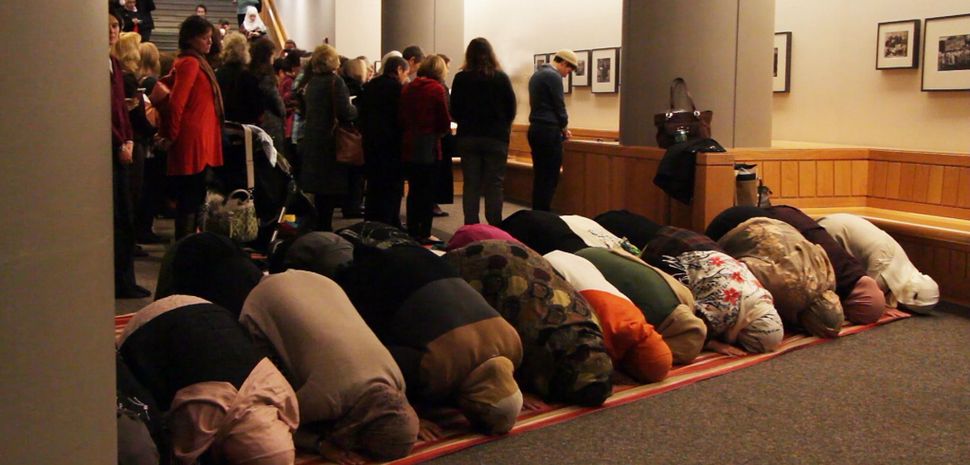Muslim and Jewish Feminists Gather to Seek Common Ground

Image by Riverview Studios
Heba Macksound, a founding member of the first Sisterhood of Salaam Shalom Jewish-Muslim women’s interfaith dialog chapter, tells her story. “I was in the detergent aisle at ShopRite, thinking about what most Muslim women think about in the detergent aisle — which brand, and how many ounces to buy — when a man started cursing my hijab.” Macksound had the presence of mind to seek out the manager. “I am afraid to shop in your store,” she told Mark Egan. Egan responded by personally escorting her on her shopping trip.
This incident took place before the current wave of verbal and physical attacks on American Muslims. Indeed, Muslim women are increasingly feeling threatened and vulnerable. Vicious Islamophobia is unbridled in many quarters; politicians are actively suggesting registries and advocating collective punishment for Muslims based on the actions of Islamist extremists. Since the Paris attacks there have been over 50 reported acts of violence and harassment against American Muslims. In Philadelphia — the “City of Brotherly Love” — a pig’s head was left in front of a mosque. I recently had the privilege of being one of 350 participants at the Sisterhood’s 2nd annual convention, convened at Princeton University, where ShopRite’s Mr. Egan was presented an award for modeling and providing protection. The need for women to wage peace has never been greater, and this growing initiative, co-founded by a Jewish woman, Sheryl Olitsky, and her Muslim friend Atiya Aftab, is providing a vehicle for like-minded Muslim and Jewish women to stand up and speak out in a united voice.
Currently there are 15 of these unique sisterhoods, comprised of Muslim and Jewish women, with seven more groups in start-up mode. Each chapter creates a space for its participants to share and learn about each other’s faiths and lives. Olitsky serves as Executive Director, continually stressing the need to challenge hostile stereotypes and find common ground through interfaith dialog. Students of sociologist Robert Putnam may be familiar with social capital building, the magic that happens when people spend time and get to know each other as individuals.
Intra-group social capital building is termed bonding, when people with similar backgrounds hang together—often through synagogues, cultural activities, sports, or schools. Typically this bonding is among what my adult children term “PLUs” or People Like Us — cohorts from comparable neighborhoods who speak the same language, attended the same camps or colleges, and wind up in similar economic strata.
Inter-group social capital building is called bridging, building connections across divides through organized get-togethers. Bridging is rare and challenging in the United States, given our economic, racial, ethnic, and religious tendency to self-segregate. The Sisterhood formed to bring women together, figuring they already shared gender and commitment to faith. Women who might never have had access to one another now meet regularly, listening and learning from one another and together venturing into peace-making.
The Sisterhood’s slogan, “Enriching Women’s Souls, Shattering Stereotypes” was richly manifest in our day together. Keynoter, the indomitable Ruth Messinger, celebrated the ability of women to roll up their sleeves, sit around a table, and get things done. Like resolving intractable conflicts. Messinger reminded us that our faiths move us to compassion and connection.
Vignettes from the day stick in my mind.
-
Dr. Mehnaz Afridi, a PhD who teaches Holocaust Studies at a Catholic University, addressed the group. Her bio alone is enough surely enough to defy stereotypes! She calls it. “Syria is a genocide.” She is right. We have been looking the other way.
-
Breast cancer survivors Ruth Ebenstein and Ibtisam Erekat share their friendship with us all. They met in a cancer support group in Jerusalem and immediately connected. Ruth had never, despite living in Israel for twenty years, gotten to know a Palestinian woman. “It took cancer to make that happen.”
-
I was invited to speak on being a change agent, having written a book, [“100 Under $100,”] about global women’s empowerment. I talked about signaling, modeling your values. If you are a climate change activist, you bring your own mug to public gatherings, eschewing disposables. What I had never thought about is how Muslim women with hijabs signal their identity whenever they are in public; increasingly this is putting them at risk. Rabbi Donna Kirshbaum, active in Women Wage Peace Israel invites us all to come to Israel in September, joining a massive gathering of women from Israel and around the world fed up with the lack of progress towards peace. Nobel Peace Prize laureate Leymah Gbowee will be among those marching. I was not planning to go to Israel, but I just may need to join this mobilization.
-
In a facilitated sharing session, breaking us into groups of three, a woman I would not have guessed is Muslim (yes, moving beyond stereotypes) told us her Syrian-American husband’s family has been here for 40 years. They have family trapped in refugee camps and others trying to get out. Why had I never thought of how terrifying it is to be a Syrian-American? I instantly channeled American Jews in the 1930s, trying desperately to help get their families out of danger. How odd it is, given our history of Jewish insecurity, to realize as Jews we feel far safer in America than our Muslim sisters.
These are unprecedented times, and require bold responses. Let’s use sisterhood to help love triumph over fear.
















